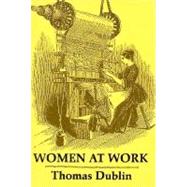Women at Work
, by Dublin, Thomas- ISBN: 9780231041676 | 0231041675
- Cover: Paperback
- Copyright: 5/1/1981
Until the nineteenth century, women were largely confined to work in the home. But in the years between 1820 and 1860 the rise of the cotton textile industry in New England radically altered women's working and living patterns. Thousands of single, young women left the homes of their parents to work in the growing mill towns and to live together in the company boardinghouses. This was the first generation of American women to face the demands of industrial capitalism. Women at Workdetails the lives of this first generation in Lowell, Massachusetts -- America's leading factory town in the middle decades of the nineteenth century. The mill experience bridged the gap between rural and urban life, as Yankee women from the countryside brought to the mill towns the rich kinship and friendship networks indigenous to preindustrial America. Thomas Dublin shows how these rural values, transplanted to Lowell's factories and boardinghouses, contributed to the emergence of a close-knit community of women workers. Recounting the birth of the American textile industry and the rise of Lowell, Dublin analyzes the social relations in the early mills, the boardinghouse community, the strikes of the 1830s, and the Ten Hour Movement organized for the reduction of hours in the 1840s. He then describes the influx of Irish and other immigrant workers who displaced the Yankee women workers and brought about the transformation of the community. The immigrant workers lived in private tenements rather than in the company boardinghouses, a family labor system replaced one consisting primarily of young, single women, and more stringent working conditions and wage cuts undermined the previous standards. The unprecedented first period of the American women's labor movement had passed.







